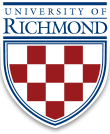UR Faculty
The collections, exhibitions, and programs at University Museums provide a valuable resource for research and creativity across many disciplines. Our staff is committed to helping faculty and students engage in experiential learning and critical thinking for a variety of curricula.
A wide range of departments regularly use the Museums in their classes, including Accounting, American Studies, Art & Art History, Classical Studies, Education, Environmental Studies, Modern Literatures and Cultures, Theatre and Dance, and many more.
To learn more about the opportunities mentioned below, contact Martha Wright, Assistant Curator of Academic and Public Engagement, University Museums, mwright3@ richmond.edu or 804-287-1258.
Ways to engage the Museums in your classes and research include:
Customizable tours
We offer interactive tours of our rotating exhibitions and the permanent collection that can be adapted to your learning objectives. Open-ended questioning and active learning techniques are employed in these tours to encourage critical thinking and communication skills. Additionally, activities and interpretive movement and sound can be employed to cultivate creative thinking and close observation skills.
Please request tours at least two weeks in advance. Tours can be arranged during and outside of normal Museums visitation hours.
Examples of worksheets that have been used for past tours:
Class discussion sites
Whenever possible and depending on the size of your class, you are welcome to hold class sessions in our exhibition spaces when our exhibitions correlate with your teaching goals. Please request using the galleries at least two weeks in advance.
Programs
Your classes are invited to participate in all Museums programs, such as lectures, artist’s talks, panel discussions, workshops, performances, etc., which are almost always free and open to the public.
Exhibitions
We regularly work with faculty from a variety of disciplines to collaborate on exhibitions based on faculty and student research and/or to coordinate with class topics. These projects usually require about two years of planning in advance, and preference is giving to projects relating to the Museums’ permanent collection. Recent examples include:
- Growing Up in Civil Rights Richmond: A Community Remembers
- 19th-Century French and Russian Art from the Virginia Museum of Fine Arts, organized in conjunction with a Sophomore Scholars in Residence Program
- Julius J. Lankes: Survey of an American Artist
- Torn from Darkness: Works by Felix Lembersky
- Feedback: Video by Artists
- Native Plants of Virginia: Selections from the University of Richmond Herbarium
Research
We are happy to provide access to any objects or artworks in our collection that may relate to your research topics. Please peruse our collection online, and contact us to schedule an appointment to view the objects in person.
Harnett Print Study Center
The Harnett Print Study Center is dedicated to the education, research, and exhibition of works on paper, and provides a forum for the study and appreciation of the visual arts. The center houses our permanent collection of prints, drawings, and photographs. It also includes an exhibition space; a print storage area; a seminar room for art history and studio art courses; and a viewing area for prints being researched by students, faculty, and visiting scholars.
To schedule an appointment for a class visit, please submit the Print Study Center request form. Museum staff will reply to requests within 24 hours.
Artwork
We collaborate with faculty from a variety of disciplines to present work created by faculty. Examples include:
- Warm Worlds and Otherwise: Brittany Nelson and Danishta Rivero
- Unexpected Smiles: Seven Types of Humor in Japanese Paintings
- Robert Hodierne: Vietnam War Photographs
- The Life in the Land: Art by Anna Líndal and Erling Sjovold
- Tanja Softić: Migrant Universe
- No Eye Flowers: Paintings, Calligraphy, and Ceramics by Stephen Addiss
Programs and Performance
We collaborate and present academic programs and performances related to faculty research and creativity. Recent examples include:
- Improvisational dance performance by Alicia Diaz, Assistant Professor of Dance, with music by percussionist Héctor “Coco” Barez, inspired by two prints in The 2014 Harnett Biennial of American Prints
- AIDS Day Theatre reading by Dorothy Holland, Associate Professor of Theatre, with two undergraduate students, in conjunction with the exhibition Mary Fisher: Messages from my Sketchbook
Guest Artists and Scholars
If you are hosting a guest artist or scholar with a specialty that relates to our exhibitions or collections, please consider working with us on joint programming.
- University Museums and the Department of Art and Art History hosted visiting artist Maria Chavez who taught classes, public workshops, presented a lecture and featured her artwork in the exhibition
Topography of Sand: Peaks & Valleys Series, New Work by Maria Chavez. - Independent scholar Audrey Yoshiko Seo curated the exhibition War-Drobe: Fantasy & Exaggeration in Contemporary Japanese Fashion.
- We’ve worked with Theatre and Dance to present gallery talks and workshops with guest choreographers such as Jessica Lang.
- We’ve collaborated with various departments to host visiting artists, such as Mona Hatoum with the Department of Art and Art History Martín Bonadeo with International Education and the Department of Latin American, Latino, and Iberian Studies.
- We’ve co-hosted scholars who have given public lectures, such as Egyptologist Bob Brier, organized with the Department of Classical Studies.


